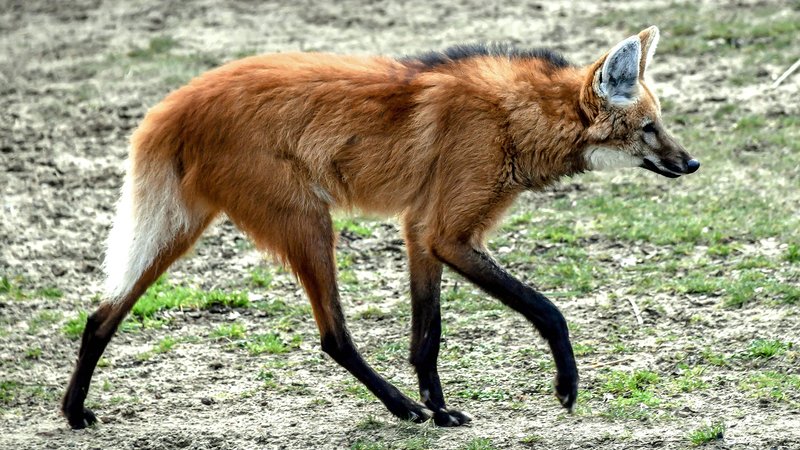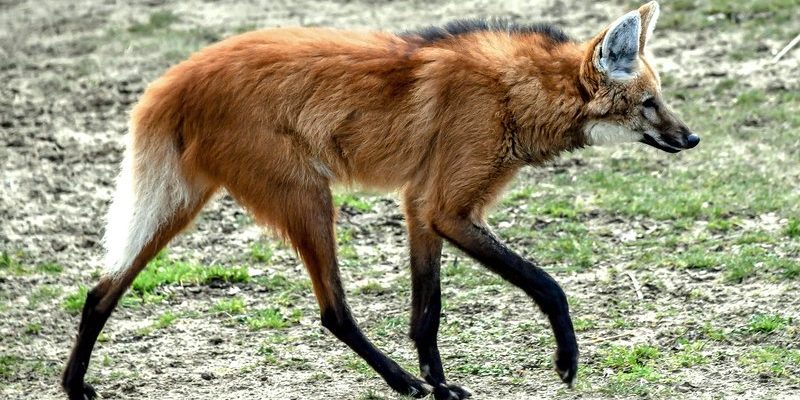
Think of the maned wolf as a bit of a mystery with a personality. They roam the grasslands and savannas of South America, where their intelligence shines through in their survival tactics and social interactions. Learning about their cognitive abilities can change how we see these animals—not just as another species on the endangered list, but as clever beings adapting to their environment. Let’s dig into what makes the maned wolf so special.
What Is a Maned Wolf?
The maned wolf (Chrysocyon brachyurus) is a striking creature that stands out with its tall legs and reddish-brown fur. Taller than most wolves, they can reach heights of up to 3 feet at the shoulder. Their long, slender limbs are perfect for navigating the tall grasses of their habitat in South America, and those long ears? Well, they not only look cute but are crucial for picking up the faintest sounds of prey hiding nearby.
These wolves are a bit of an enigma. Unlike traditional wolves that live in packs, maned wolves are mostly solitary. They’re often seen roaming alone, which gives them more freedom to explore their territory. But they still have social lives! Maned wolves communicate through a range of vocalizations, including their signature “roar-bark,” which sounds like a mix between a bark and a howl. This unique sound helps them establish their space and connect with potential mates.
Cognitive Abilities: How Smart Are They?
So, just how smart is a maned wolf? When it comes to problem-solving, these animals show fascinating signs of intelligence. They’re known for their ability to adapt to various environments and changes in their food sources. For instance, when prey becomes scarce, maned wolves can switch their diet to fruits and vegetables, showcasing their flexible eating habits.
Here’s the thing: Their brains are surprisingly large for their body size, especially compared to other canids. This suggests they have the capacity for complex thought. In the wild, they might have to navigate tricky landscapes and avoid human threats, which requires a good amount of smarts. Observations show that they can remember specific locations where food sources are plentiful, helping them maximize their foraging efficiency.
Social Behavior and Communication
Maned wolves have a unique social structure that influences their behavior. Unlike pack-living wolves, they are often solitary but do form pairs and family units during breeding season. Their social interactions are less about hierarchy and more about partnerships. When they meet other wolves, they engage in behaviors like tail wagging and playful biting, which can be likened to a game of tag.
You might be wondering how they communicate their feelings. Beyond vocalizations, they use body language to express their emotions and intentions. For instance, if a maned wolf feels threatened, it may stand stiffly, while a relaxed wolf will exhibit a more fluid posture. This ability to read and respond to social cues is an essential part of how they navigate relationships with other wolves and their environment.
Hunting Strategies and Problem-Solving Skills
When it comes to hunting, maned wolves are creative and strategic. They primarily feed on small to medium-sized mammals, birds, and insects, but they can also eat fruits like the cayote apple. What’s interesting is how they hunt; instead of relying solely on speed, they use their intelligence to stalk and ambush their prey.
A common tactic involves using their keen eyesight and acute hearing to detect movement from afar. Once they locate potential prey, they can stay low and move quietly, using their long legs to make calculated strides. Their problem-solving skills shine when they adapt to different strategies based on the type of prey or the environment. For instance, if they’re hunting in a dense thicket, they might approach more stealthily compared to an open area where they can sprint.
Adaptability in Urban Environments
As human activity expands into natural habitats, maned wolves are forced to adapt. Surprisingly, they can thrive in urban settings, something that not all wildlife can manage. They’ve been spotted in cities and around agricultural areas, looking for food and shelter.
This adaptability highlights their cognitive abilities. Maned wolves have shown that they can learn quickly from their surroundings. They might forage in gardens, dodge traffic, and find new places to stay hidden. Their ability to adjust their behaviors based on urban challenges demonstrates a level of intelligence that is quite remarkable. It’s a testament to their resilience and creativity in the face of change.
Conservation and Future Outlook
Despite their fascinating abilities, maned wolves face numerous threats, mainly due to habitat loss and human-wildlife conflict. Understanding their intelligence and adaptable nature is crucial for conservation efforts. If we recognize these wolves as intelligent beings capable of problem-solving, we might be more motivated to protect their habitats.
Efforts to conserve their environments and reduce human impact will go a long way. Education about their role in the ecosystem can help foster a greater appreciation for these unique creatures. It’s essential to work towards solutions that allow maned wolves to thrive both in wilderness and in urban spaces.
The maned wolf is a remarkable blend of beauty, intelligence, and survival instinct. Their cognitive abilities and social behaviors paint a picture of an animal that is not just surviving but thriving against the odds. By understanding their unique characteristics, we can appreciate the maned wolf not just as a fascinating species but as a testament to the resilience of wildlife. Let’s cherish and protect these clever creatures, ensuring they continue to roam their territories—both wild and urban—for generations to come.

